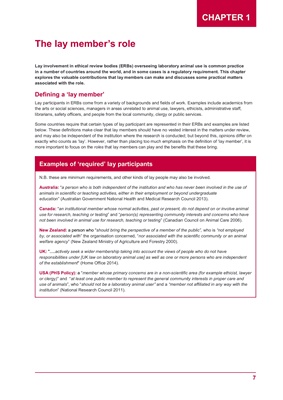
7
CHAPTER 1
The lay member"s role
Lay involvement in ethical review bodies (ERBs) overseeing laboratory animal use is common practice
in a number of countries around the world, and in some cases is a regulatory requirement. This chapter
explores the valuable contributions that lay members can make and discusses some practical matters
associated with the role.
Defining a "lay member"
Lay participants in ERBs come from a variety of backgrounds and fields of work. Examples include academics from
the arts or social sciences, managers in areas unrelated to animal use, lawyers, ethicists, administrative staff,
librarians, safety officers, and people from the local community, clergy or public services.
Some countries require that certain types of lay participant are represented in their ERBs and examples are listed
below. These definitions make clear that lay members should have no vested interest in the matters under review,
and may also be independent of the institution where the research is conducted; but beyond this, opinions differ on
exactly who counts as "lay". However, rather than placing too much emphasis on the definition of "lay member", it is
more important to focus on the roles that lay members can play and the benefits that these bring.
Examples of "required" lay participants
N.B. these are minimum requirements, and other kinds of lay people may also be involved.
Australia: "a person who is both independent of the institution and who has never been involved in the use of
animals in scientific or teaching activities, either in their employment or beyond undergraduate
education" (Australian Government National Health and Medical Research Council 2013).
Canada: "an institutional member whose normal activities, past or present, do not depend on or involve animal
use for research, teaching or testing" and "person(s) representing community interests and concerns who have
not been involved in animal use for research, teaching or testing" (Canadian Council on Animal Care 2006).
New Zealand: a person who "should bring the perspective of a member of the public", who is "not employed
by, or associated with" the organisation concerned, "nor associated with the scientific community or an animal
welfare agency" (New Zealand Ministry of Agriculture and Forestry 2000).
UK: "….actively seek a wider membership taking into account the views of people who do not have
responsibilities under [UK law on laboratory animal use] as well as one or more persons who are independent
of the establishment" (Home Office 2014).
USA (PHS Policy): a "member whose primary concerns are in a non-scientific area (for example ethicist, lawyer
or clergy)" and "at least one public member to represent the general community interests in proper care and
use of animals", who "should not be a laboratory animal user" and a "member not affiliated in any way with the
institution" (National Research Council 2011).